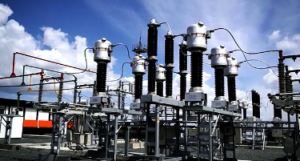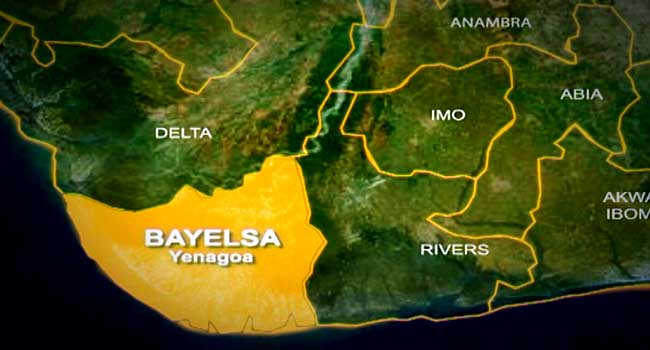Bayelsa State is facing an imminent and prolonged period of blackout following the devastating vandalization of 13 transmission towers along the Ahoada-Yenagoa 132kV Double Circuit transmission line. This unfortunate development, which also affects several communities in Rivers State, has raised significant concerns over the state of power infrastructure in the region.
In an official statement released on Wednesday by the General Manager of Public Affairs at the Transmission Company of Nigeria (TCN), Ndidi Mbah, the extent of the damage was disclosed. The statement revealed that the scale of the vandalism was uncovered during an inspection led by Emmanuel Akpa, the General Manager of the Port Harcourt Transmission region. Upon visiting the site, the team found that all 13 transmission towers, spanning from Tower 52 to Tower 64, had been severely compromised. Out of these, nine towers had completely collapsed, while the remaining four are in such a precarious condition that they are at risk of collapsing at any moment.
The discovery of this sabotage was initially reported by the Youth President of the Ukpeli Community in Rivers State on August 12, 2024. This early report prompted TCN to conduct an immediate and thorough investigation, which has now confirmed the gravity of the situation.
The Ahoada-Yenagoa 132kV Double Circuit Transmission line is a critical infrastructure for the region, serving as the main conduit for power evacuation from the Ahoada Transmission Substation to the Yenagoa Substation. The Yenagoa Substation, in turn, is responsible for supplying electricity to the entire Bayelsa State. With the extensive damage to these transmission towers, the power supply to Bayelsa is effectively crippled, plunging the state into darkness.
 The implications of this act of vandalism are far-reaching. As Mbah noted in the statement, given the scale of destruction and the ongoing repairs to previously vandalized transmission towers, it could take several months for the Transmission Company of Nigeria to rebuild and re-string the affected towers. This means that residents and businesses in Bayelsa State may have to endure a prolonged period without electricity, which could have devastating effects on the local economy and quality of life.
The implications of this act of vandalism are far-reaching. As Mbah noted in the statement, given the scale of destruction and the ongoing repairs to previously vandalized transmission towers, it could take several months for the Transmission Company of Nigeria to rebuild and re-string the affected towers. This means that residents and businesses in Bayelsa State may have to endure a prolonged period without electricity, which could have devastating effects on the local economy and quality of life.
Sule Abdulaziz, the Managing Director and Chief Executive Officer of TCN, has described this incident as a “national disaster.” He expressed deep concern over the increasing frequency and scale of vandalism targeting the country’s power infrastructure. According to Abdulaziz, the repeated attacks on critical transmission lines have become “increasingly alarming and overwhelming,” necessitating urgent intervention from both state and federal authorities.
In his appeal, Abdulaziz called on the governments of Rivers and Bayelsa states to assist TCN in curbing this wave of vandalism. He emphasized that protecting the nation’s power infrastructure is a collective responsibility, and that the support of local communities and governments is essential in preventing further incidents.
The TCN’s ongoing efforts to restore and reinforce the Ahoada-Yenagoa line have been substantial, but the scale of the challenge has grown significantly with this latest act of vandalism. Abdulaziz pointed out that TCN had only recently responded to a previous incident of vandalism and collapse involving Towers 97 to 99 along the same transmission line route. That incident, which occurred on July 29, 2024, had already stretched TCN’s resources, with reconstruction work still underway at the time of this latest sabotage.
Moreover, in a bid to prevent future incidents, TCN had awarded a new contract for the reinforcement of Towers 19 to 31 on the Ahoada-Yenagoa line. This contract was specifically aimed at addressing vulnerabilities where tower members had been stolen or vandalized. Despite these proactive measures, the recent attack on the 13 towers has compounded the difficulties, presenting a “significant challenge” to the company’s efforts to maintain and restore power supply.
The vandalized towers are located across several communities, including Okobe in Ahoada East, Emezhi 1 in Ahoada West, and Mbiama in Ahoada West Local Government Areas of Rivers State, as well as the Igbogene community in Bayelsa State. These locations highlight the widespread nature of the attack and the challenges that TCN faces in securing and protecting its infrastructure across multiple jurisdictions.
As the affected communities brace for the impact of this prolonged blackout, there is a growing sense of urgency for all stakeholders to come together to address the underlying issues of vandalism and insecurity that threaten the stability of Nigeria’s power grid. The road to recovery will be long and arduous, but with coordinated efforts and a renewed focus on safeguarding critical infrastructure, there is hope that the region can eventually overcome this crisis.




